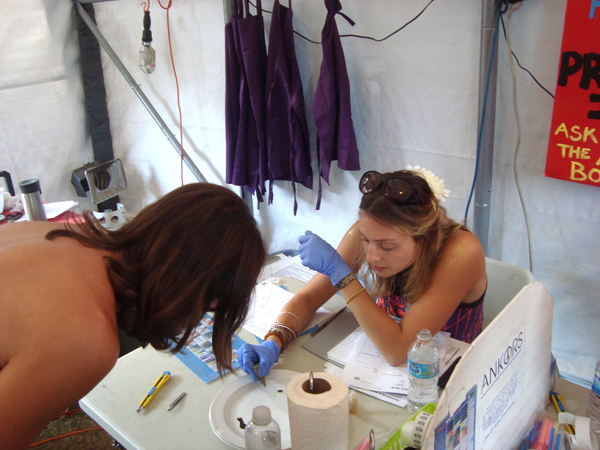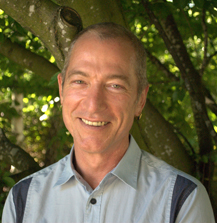Drug checking at music festivals
by Warren Michelow
The summer music festival season is full of fun and excitement, but there can be a dark side to the exuberance—people overdosing or suffering negative effects from drugs. Too often, what someone buys as ecstasy turns out to be something else, including chemicals with a history of causing injury or death. Enter drug checking, a quick and simple method for screening drug samples. The technique uses reagents to indicate the presence of target chemicals through changes in colour. While most of these tests don’t determine dose or purity, they do help people know if they are getting what they paid for and can identify contaminants or unwanted substances.
Drug checking using both reagent-based screening and mobile laboratories has been available at European venues since the 1990s. To date, tougher drug control in North America has made it harder to provide drug checking here; nevertheless, several community groups in Canada and USA have offered drug checking at events over the years. For example, ANKORS (AIDS Network Kootenay Outreach and Support Society) in Nelson, BC has provided drug checking at the Shambhala Music Festival for over a decade1.

Chloe Sage from ANKORS and Warren Michelow, a graduate student associated with CARBC, have just released “Drug checking at music festivals: A how-to guide”, funded by the BC Ministry of Health, that distills knowledge and practices learned from providing drug checking and other harm reduction services at music festivals and events since the early 2000s. The guide is intended to help people in the community and public health groups interested in providing services at events or in other community settings. It describes in practical detail how to set up and run a drug checking service, how it can fit with other health-related services at a festival, and how to do the testing in a legal way.
Drug checking services are accessed by people interested enough in using drugs to already be in possession of a substance they intend to use. Seeking out drug checking demonstrates an interest in health-oriented information about substance use and potential hazards associated with the substance they think they have. Describing the strengths and limitations of results from reagent-based screening and getting confirmation of understanding is a key part of a drug checking encounter (see “Testing Disclaimer” in the Guide for an example). The natural flow of a testing encounter offers a scaffold to engage in conversation about drug-related knowledge and strategies for responsible use and managing risk. Field experience shows that after receiving an unexpected result—especially one that suggested the presence of something known to be harmful, e.g., suspected PMMA—people choose to dispose of that substance rather than take it2.
Between 2008 and 2015, the United Nations early warning system received reports of 644 new psychoactive substances with 75 being reported in the first part of 2015 alone3. Sometimes these are sold as exotic new “legal highs”, but often they are misrepresented as more popular and better known drugs such as ecstasy or LSD. Being so new, we know little about the potential for adverse health effects from consuming these substances.
Having capacity to screen for misrepresented substances and known hazardous substances is an essential tool for preventing avoidable harm at festivals and other entertainment venues where substance use takes place. In the absence of any better alternative, rapid presence/absence screening serves a vital public health function.
Download the guide and find related resources at http://michelow.ca/drug-checking-guide/ and http://www.ankorsvolunteer.com/.
1 Warren Michelow, Cheryl Dowden. “Start Small, Take it Easy” Results from the ANKORS Harm Reduction Survey at the 2013 Shambhala Music Festival. Available at http://michelow.ca/r/smf2013rep.
2 Chloe Sage. Harm Reduction and Drug Checking: A wrap-around service for festivals. Case Study: Shambhala Music Festival /ANKORS Drug Checking Harm Reduction Service data 2015. Available at http://michelow.ca/r/smf2015dcsum.
3 United Nations Office On Drugs and Crime. World Drug Report 2016. (United Nations publication, Sales No. E.16.XI.7). Available at http://www.unodc.org/wdr2016/.
 Warren Michelow is a graduate student affiliated with the Centre for Addictions Research of BC. He is currently a Ph.D. candidate in the School of Population and Public Health at UBC and his doctoral research is on simultaneous polysubstance among mainstream substance users. He has received the Frederick Banting and Charles Best Canada Graduate Scholarships Doctoral Award, the Integrated Mentor Program in Addictions Research Training Fellowship and a MITACS ACCELERATE Internship.
Warren Michelow is a graduate student affiliated with the Centre for Addictions Research of BC. He is currently a Ph.D. candidate in the School of Population and Public Health at UBC and his doctoral research is on simultaneous polysubstance among mainstream substance users. He has received the Frederick Banting and Charles Best Canada Graduate Scholarships Doctoral Award, the Integrated Mentor Program in Addictions Research Training Fellowship and a MITACS ACCELERATE Internship.
